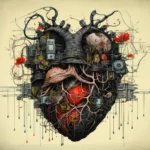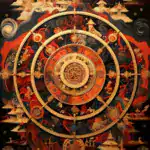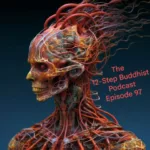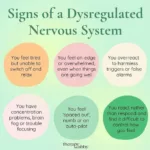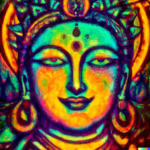Episodes
Buddhist podcast
-
Addiction and Trauma: A Basis for the Practice of Recovery
Addiction and Trauma: A Basis for the Practice of RecoveryThe Dysregulated Addict: Finding Spiritual Regulation Series Pt. 6The 12-Step Buddhist Podcast Episode 101Review of this series so far. **Understanding ACEs:**- **Definition and Types:** Physical abuse, emotional scars, a home where chaos reigns. These are ACEs, wounds that shape us, echoes of the storms we explored in the nervous system. They are the unseen baggage we carry, the ghosts that haunt our minds.- **Prevalence:** You're not alone. Millions bear these scars, these memories that refuse to fade. by hope.
-
ACEs High – Heart Open
Part 5: Mindfulness for Addicts with ACEs The Impact of ACEs on the Brain and the Path to Addiction** **Introduction:** Remember our journey through the nervous system, the dance of the sympathetic and parasympathetic, the weight of allostatic load, the boundaries of the window of tolerance? Now, let's delve into ACEs, the unseen wounds that shape us, the scars that linger in our brains, our hearts, our very souls. **Understanding ACEs:** - **Definition and Types:** Physical abuse, emotional scars, a home where chaos reigns. These are ACEs, wounds that shape us, echoes of the storms we explored in the nervous system. They are the unseen baggage we carry, the ghosts that haunt our minds. - **Prevalence:** You're not alone. Millions bear these scars, these memories that refuse to fade. They linger, affecting our health, our relationships, our very essence, adding to the allostatic load we discussed earlier. **The Neurobiology of ACEs:** - **Brain Structure and Function:** Imagine your brain, a delicate machine, wired for love, trust, joy. Now imagine it altered, scarred by trauma. The prefrontal cortex, the seat of reason, impaired. The hippocampus, the keeper of memories, wounded. It's not just science; it's a tragedy played out in the very fabric of our being. - **Stress Response System:** A child in constant fear, a body always ready to fight or flee. The stress hormones flood, the balance is lost, and the dance becomes a battle. It's the window of tolerance, shattered and fragmented. It's not just biology; it's a daily struggle for peace, for normality.
-
Calming the Fires – Allostatic Load, Window of Tolerance
Part 4: Balance in the Nervous System -Allostatic Load, Window of Tolerance This is where we encounter something called 'allostatic load.' Now, 'allostasis' is the process by which our body seeks to maintain stability, or homeostasis, through change. It's like a scale, constantly adjusting to keep balanced. But when we're exposed to repeated stressors, this scale can get tipped. The constant 'wear and tear' on our bodies, the continual need to adjust and readjust, can lead to what's known as allostatic load or overload. In the context of addiction, this allostatic load can become a heavy burden. The compulsion to seek and take a drug, the loss of control in limiting intake, and the emergence of a negative emotional state when access to the drug is prevented, all contribute to this load.
-
Balancing Our Nervous System – The CNS and Stress
Balancing Our Nervous System - The CNS and Stress The Dysregulated Addict: Finding Spiritual Regulation Series Pt. 3 Happy First Turning of the Wheel of Dharma Day The 12-Step Buddhist Podcast Episode 098 Part 3: Balance in the Nervous System - The CNS and Stress
-
The Dance of the Nervous System – Sympathetic and Parasympathetic; Finding Spiritual Regulation Series Pt. 2
Finding Spiritual Regulation Series Pt. 2 Episode 2: The Dance of the Nervous System - Sympathetic and Parasympathetic Deep dive into the sympathetic and parasympathetic nervous systems Their roles in stress, relaxation, and recovery Practical ways to balance these systems for better mental health
-
The Dysregulated Addict: Finding Spiritual Regulation in Recovery Series Pt. 1
Do you get distressed easily in sobriety? You may have a disregulated nervous system. If so, it's important not to compare your insides with anyone else's outsides. In Compassionate Recovery: Mindful Healing for Trauma and Addictions, we gain an overview of what is happening in our brain and body when it comes to trauma, addiction and recovery. All are welcome. No experience necessary. Join us for meditation and discussion on topics that you can apply to your recovery right away.
-
Into the Fire; How to Transform Experience into Dharma
Everything is the path to enlightenment. The ground is everywhere. We can't step anywhere exept deeper into Teaching. More authentically into practice.
-
Curb That Dharma Ego
What is ego, and how does it affect our practice as Buddhists in Recovery? When we practice Dharma, are we taking refuge in our identity, apparently concrete and permanent sense of self, or are we working to let go, to discover our real nature, same as all Buddhas and Bodhisattvas of the Three Times and the Ten Directions. No different. To understand this context, in this sense of the Teaching, one must find a qualified Master and receive detailed instructions on how to overcome samsara without resisting our suffering, or our Buddhahood. Listen in as we practice and discuss the how and why of Dharma in Recovery, instead of constructing an even more elaborate and sophisticated trap, called the Dharma Ego.
-
Taking Refuge in Compassion
We have to understand our condition to empower ourselves into a trajectory beyond suffering. How to arrive at this understanding, and then integrate this real, non-artificial Buddha Superinteligence that is our real condition, as blind as most of us are to that. The teachings afford us opportunities to tap into, develop and maintain our true state of Absolute Compassion, the only deity we'll ever need. Let's yack about it and do some practice on this week's episode.
-
Birth of the Birthless; Refuge and Bodhicitta in Daily Life pt. 3
Buddha's Birthday - Saka Dawa If you were born after the 70s, your ideas of Dharma are probably your grandmothers, or even great grandmothers. So this here what we do on the podcast, this ain'tcher granny's dharma, y'hear? Listen in and listen up as we break it down as to exactly what it means to be born into the birthless, just like Buddha.

Translate
Photo courtesy @dan_cey_

Topics of Interest

